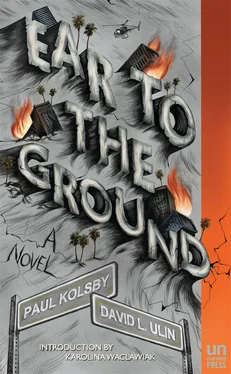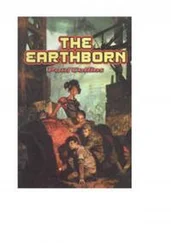Grace stood alone by the windows, her back to the others. All week, she had ignored messages from Ethan, even as they grew increasingly desperate. What concern was it of hers if Ear to the Ground became a multimillion-dollar flop? In a certain sense, Grace believed in karma, and if you thought that way, Ethan was getting his. Stuck in the middle of production, watching it fall to pieces, with his starched shirt collar finally slicing through the tender skin of his neck.
But then Bob Semel had called her and explained how much he wanted her around. If she would return, he would consider it a personal favor, and personal favors were always repaid. Exactly what that meant had yet to be determined, but Grace knew she had been noticed, and that she was finally in position to leave these three assholes behind.
Grace was interrupted by a door swishing open on well-oiled hinges, and the padding of Ehrich Weiss’s expensive loafers across the floor. The doctor nodded at no one in particular, then took a seat behind his desk. “Act one,” he announced, “getting to know you.” When no one uttered so much as a hello, he spread his hands and said, “Let’s not all talk at once.”
LOUIS NAVARO ROSE AT SEVEN-FIFTEEN THURSDAY morning to the sound of a Skilsaw buzzing through wood. At first, he just pulled the pillow over his head and tried to go back to sleep, but then he realized the noise was coming from his own backyard. He raised his body out of bed slowly and grabbed a ribbed undershirt and a pair of workpants. Then, lighting a Pall Mall and coughing the day’s first cough, he headed outside to see what the hell was going on.
In the yard, he discovered Charlie Richter, covered in sawdust and dirt, fitting a long two-by-four into what looked like an oversized frame. It was an oddly shaped construction, and Navaro noticed another, parallel structure already put together and leaning up against the house.
Navaro cleared his throat. “Little early in the day for this, wouldn’t you say?”
Charlie jumped at the sound of his landlord’s voice. “Oh, Mr. Navaro. Sorry if I disturbed you.”
“Disturbed me?” Navaro took another pull off his cigarette and threw it to the ground. “You woke me up. What the …”
“It’s a model,” Charlie said.
“A model. Just what I was thinking.”
“It’s the San Andreas, see? A replica. I’m going to rig a generator …”
“Yeah, yeah,” Navaro said, lighting his second cigarette. “You do that. But do me a favor, will ya?”
Charlie nodded.
“Don’t be sawing any wood before nine.”
Exactly six days later, Charlie finished his model, and stood over it like a god. Before him lay a panorama of the desert that was so realistic it could have been used as a miniature set for Ear to the Ground. The two wooden forms had been fitted into the frame, filled with dirt and earth, and landscaped to replicate the barren crags and rocky hillocks outside San Bernardino. Charlie had even included lichen and small bushes to approximate desert growth.
The entire structure stood on a platform supported by sawhorses, beneath which sat a small gasoline generator and a system of pulleys and winches. When Charlie tested the machinery, the effect was quite convincing: As pressure built, the forms began to grind until, with a rip, they slid apart, rending the earth of this model world. It was exactly what would happen on December 29 th. Exactly what was happening already under the ground.
Then Charlie went about setting up the charge. By his side were plastic explosives, which he lifted gingerly from a corrugated box. When the time came, he would have to know the exact direction of the slippage, which would determine the direction of the neutralizing charge. This was the wild card and, in the end, he’d have to make an educated guess. For now, the only question was simply whether or not a retroshock would work.
Charlie took the packs of explosives and joined them to create a single, or united, charge. Out of one end ran an electronic fuse, controlled by remote; out of the other was a detonator pin which would conduct and focus the explosive charge, with pinpoint accuracy, to a specific place in the model’s crevice.
When the wiring was complete, Charlie carried the remote to a far corner of the yard. It was only then that he realized he had forgotten, for quite some time, to breathe. He looked up and noticed the way the sky crested above the treetops and extended upward, out of reach. It felt like the moment before a thunderstorm, the moment before a fight. “OK,” Charlie whispered, as if a normal tone of voice would detonate the charge.
Then he flipped the switch, and all hell broke loose.
The call came in at three-seventeen — an explosion at 418 North Spaulding Avenue. Parked in the lot at Canter’s, having a cup of coffee and eating a knish, Officer Eric Blair picked up his handset and radioed that he was on his way.
When Blair arrived on the scene, there was the usual complement of reporters, all screaming frantically into cell phones and trying to get inside. A second police cruiser pulled up simultaneously, and two officers set up a barrier across the street. Blair walked around to the back of the building, where smoke continued to billow lazily into the air. By the fence, what looked like an oversized ping pong table lay in several pieces on its side. A hole had been blown through one end, and there was a three-feet-deep crater in the ground.
Another policeman entered the yard and began to comb for evidence. Blair approached Charlie, who was sitting on the back stoop. His white button-down shirt was streaked with dirt; his eyes were glazed, his lashes singed.
“You all right?” Blair asked.
Charlie nodded, staring at the place where his model once stood.
“Then would you mind explaining what the hell is going on?”
LOUIS NAVARO HAD AN APPOINTMENT WITH THE TICKER doctor in Torrance at one, so he decided to pay a surprise morning visit to the home of his handyman, with the intention of finding out if the guy was truly a lousy worker or just in the habit of drinking early. Navaro could forgive the man his mediocrity, could forgive even his own mediocrity, but a drunk was a drunk was a drunk.
The handyman lived on Las Palmas Avenue, north of Hollywood Boulevard — in the land of malt liquor and crack smoke, of struggling guitar players and cold beans eaten from from cans. Navaro had planned only to drop in, say hello to the guy and check him out, then hop right on the 101 and pick up the 405 down to Torrance. At ten o’clock, though, the handyman didn’t answer his door, so Navaro decided he’d walk around the neighborhood to see how it had changed.
He didn’t get far. Hollywood Boulevard was closed to pedestrian and vehicular traffic from Highland to Fairfax. Proprietors of seedy establishments stood on sidewalks, arms folded, incensed; the tourists had no way to get to those T-shirts and fuzzy dice and postcard racks. At a street corner, as Navaro hit the change-light-please button, a policeman stopped him with his arm.
“Closed off. Sorry.” In his other hand the cop held a Mag-Lite like a billy club.
“What’s going on?”
“Making a movie.” The cop sounded like he was directing it. “Warners. Earthquake picture. Big one.”
Navaro sighed, then noticed a guy behind the barrier — a familiar face. The guy wore a black linen suit and spoke on a cellular phone. Navaro squinted, and it came to him.
“Hey! Ian!”
“OK, fella!” The cop held out his flashlight.
“I know that guy,” Navaro told him.
Читать дальше












